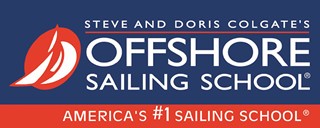Sailing trivia is a great way to get your non-sailing friends interested in sailing. It’s also fun to challenge experienced sailors when you’re relaxing on deck or enjoying a beer at the club. There are books around that list tons of sailing trivia facts, and while you are learning to sail, cruise or race at Offshore Sailing School, you will find your instructor to be a font of information when it comes to obscure and fun sailing and maritime trivia. Here are a few tidbits to put in your sailing cap!
Above Board
Pirates would often hide much of their crew below the deck. Ships that displayed crew openly on the deck were thought to be honest merchant ships known as “above board.”
As the Crow Flies
The most direct route from one place to another without detours. Before modern navigational systems existed, British vessels customarily carried a cage of crows. These birds fly straight to the nearest land when released at sea, thus indicating where the nearest land was.
Bitter End
The last part of a rope or final link of chain. The end attached to the vessel, as opposed to the “working end” which may be attached to an anchor, cleat, other vessel, etc. Today the term is used to describe a final, painful, or disastrous conclusion (however unpleasant it may be).
Fits the Bill
A Bill of Lading was used to acknowledge receipt of goods and the promise to deliver them to their destination in good or like condition. Upon delivery, the goods were checked against the Bill of Lading to see if all was in order. If so, they “fit the bill.”
Footloose, and Footloose and Fancy-Free
The word comes from the name of the bottom of a sail – the foot – which must be attached to the boom. If it is not properly attached it may become “footloose” causing the vessel not to sail properly. Footloose and fancy-free have come to mean someone acting without commitment.
Freeze the Balls Off a Brass Monkey
Cannon balls where piled on deck beside the cannon, pyramid fashion, and retained in a ring called a brass monkey. If the weather was very cold the brass ring would contract faster than the iron cannon balls, thus causing some of them to topple. From this, the expression was, and is today, used to describe something which is very cold.
In the Doldrums
Doldrums is the name of an area of the ocean on either side of the equator. This area is known to have unstable and light wind conditions. A sailing ship caught in the Doldrums can be stranded due to lack of wind. Today the term is used to describe someone as being in low spirits, stagnated or depressed.
Letting the Cat Out of the Bag
This term comes from the old naval punishment of being whipped with a “cat o’ nine tails.” The whip was kept in a leather bag and when the sailors “let the Cat out of the bag” they had usually done something that would result in punishment. The term today means someone has said something that was not to be said, or revealed a secret.
Limey
Formerly a term that refers to a British sailor, now this is also used generally to indicate a British person. The term came from the seventeenth and eighteenth century practice of issuing limes to British sailors to combat scurvy (a vitamin C deficiency).
Mind your P’s and Q’s
Sailors would get credit at the taverns in port until they were paid. The barman would keep a record of their drinks on a chalkboard behind the bar. A mark was made under “P” for pint or “Q” for quart. On payday, the sailors were liable for each mark next to his name, and forced to “mind his P’s and Q’s.” Today the term means to remain well behaved.
No Room to Swing a Cat
During the whipping punishment using the “cat o’ nine tails,” all hands were called on deck to witness. With a full crew, the deck could be so crowded that the cat o’ nine tails was difficult to use without hitting other crew members. In other words, there was “no room to swing a cat.” Today the expression is used to indicate crowded or packed surroundings.
Pipe Down
This originally nautical term was used as an officer’s whistle sound, denoting the completion of an above-deck work shift, and thereby giving permission to go below. This expression is now used to mean “be quiet” or keep quiet.”
Posh
Today this word means superior or fashionable and expensive. The word originated in colonial Boston where the trunks of wealthy passengers would carry the label “POSH,” which stood for “Portside Out Starboard Home.” This instructed the luggage handlers where to place the luggage to avoid intense sun exposure.
Skyscraper
This word is most commonly used to describe a tall building. It originates from the term for a small, triangular-shaped sail that was set above the other sails on the old square-rigged vessels. They were so tall they seemed to scrape the sky.
Square Meal
This is an expression synonymous with a proper or substantial meal. It originated from the square platters that were used to serve meals aboard ships.
Three Sheets to the Wind
This expression meant that one did not have control of the vessel because one had lost control of the sheets or lines. Today the expression is used to refer to someone who is drunk or does not have control of himself or herself.
If you enjoyed our maritime trivia and sailing facts, consider one of our courses to learn more even about sailing! All Offshore Sailing School instructors have stories to tell and tidbits to impart. Contact us today for a fun-filled learning experience!

